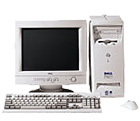Hardware Wars - who will win?
(you will..)

Hardware Wars - who will win?
(you will..)

Times seem to be down in the tech sector. Stock prices are at an all time low. Companies are declaring losses.
Dell, Gateway and Compaq are the major players in the mass-market computer industry and are offering great deals.
![]()
It seems that Michael Dell of Dell computer wants to draw blood. Dell is offering a Pentium III 1 Gigahertz (1,000 megahertz) computer with 15" monitor for $699! Dell recently overtook Compaq as the world's largest supplier of PCs through aggressive pricing.

Is a $699 computer good enough for me?
Sure, if you need a good all-purpose computer, which most folks need.
This would be home finances, e-mail, word processing, productivity and
educational software.
If you need a cutting edge computer, that can handle digital
video or still image editing, streaming audio and video, multi-media, intense
gaming and multi-tasking which will set you back $2,000, that's okay. If
you put your bragging rights away, you'll not need something fast.
How long will a $699 computer last?
Depends on how often you want to upgrade software/hardware. If you buy the computer, load it up with memory, purchase a scanner and printer, get a Microsoft Office XP suite and not planning on doing much more. The computer will last you 5-6 years.
Down the road, you want to run the latest version of Microsoft super-duper operating system. It may work, but 'not exactly'. You see a scanner and don't have the correct connection, maybe it's a Firewire port. You could possibly upgrade your computer to have a Firewire port and see if it will work…
So, what are you saying?
Lower end machines, to make them lower end - cut corners - including built-in audio and video, less expansion slots to name a few. This may never be a concern to you unless you upgrade. Sometimes, you can't disable the on board audio to add a fancy audio card. Most folks will never upgrade their computers.
What about Mac's? Unfortunately, just as soon as Apple licensed the Mac OS to other vendors, Apple's sales fell off. The whole idea was to bring in new customers to the Apple family. What happened was competitive pricing to the same customer base. Apple makes it money by selling hardware and software, selling the operating system alone did not bring in enough money. Apple would just not renew the licenses, but has learned it can not rest on it's laurels and be aggressive in it's pricing.
What do I need to look for (in any) computer when pricing?
1. Processor speed
2. Hard Drive size
3. RAM
(Optional things to worry about)
1. Monitor size
2. Printer
3. Additional functionality such as a CD burner
There is no need to buy the monitor and printer at the same time through
mail order. More later…
What's the drawback?
If you never plan on upgrading some aspects of the machine, varies from machine to machine, then these inexpensive computers are for you.
If you are into upgrading, gaming, high-end computer graphics, you'll want to look at higher priced computers and/or computers of where you can easily replace parts or order optional parts when the computer is been built.
Options, the price of the initial computer can go up quickly.
"I will sign you up for the rustproofing and special fabric sealant on your new car. As a friend, I wouldn't even think of ever leaving the dealer without them. It adds to the resale value…"
Yeah right….
Here is where the computer manufacturers make their money. These options
are sometimes worthwhile, unless you never use them. What is the
point in having a DVD drive installed if you never plan on watch and DVD
movies from your computer desk? If you fly a lot and carry a portable,
or have a small dorm hall and space is at a premium, a DVD drive might
be a worthwhile option.
I mean, how fast a computer do you need to type a letter?
A faster computer does not mean you will type the letter any faster.
About the printer and monitor....?
Buy them locally - the weight of a regular monitor is heavy - 60 pounds
or more! Shipping costs are expensive. If possible, save money on
shipping and buy locally.
Alternatives
Build your own!
Yes, It's not hard to build a computer, but you'll need help and assembly and testing can reach a level of frustration you've never (or want to) experience.
Every PC-based home computer requires the following core components to operate with today's software:
Central Processing Unit, or CPU
Memory, or RAM
CD-ROM or DVD-ROM Drive
Motherboard
Keyboard and Mouse
Video Card
Sound Card
Monitor or Display
Hard Disk Drive
Floppy Disk Drive
Case and Power Supply
There are also some optional parts which you might need:
Modem
Network Interface Card, or NIC
Two biggies that might not make it price effective for you to build.
1. No operating system.
This is not a good option for a rank beginner, for things can go wrong if the hardware you choose to install may not be seen by the operating system. You can buy a copy of an operating system, the two major ones is Microsoft branded and Linux.
Linux, many different types of Linux flavors exist - the price is from free to under $200. The operating system is free, what you pay for is tech support.
Microsoft products such as Windows 98, ME and 2000. 98 and ME
is $209.00 and Win2000 professional is $319
2. No warranty.
That's not totally true - the individual pieces that make up your computer,
if new, will carry a warranty and it's you that need to determine what
isn't working. This could be very time consuming especially if you
need to buy another part to prove the part in question is broken.